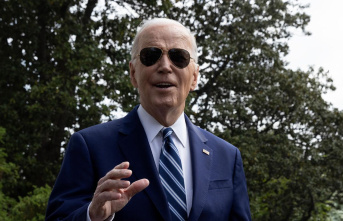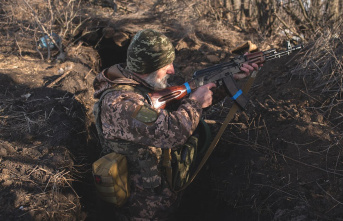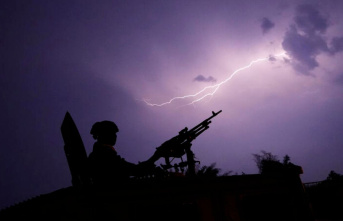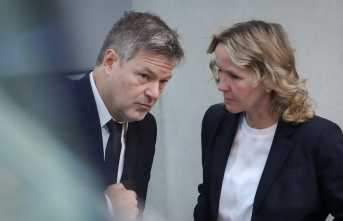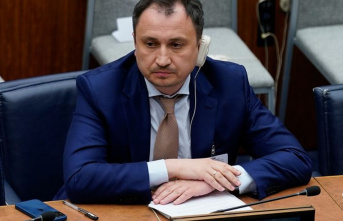The prisoners, tattooed all over their bodies, run between rows of hooded police officers in El Salvador's new maximum security prison - dressed only in white shorts, their hands tied behind their backs. Pumping music, fast cuts. The government of right-wing populist President Nayib Bukele stages the relocation of the gang members as an action film.
The professionally shot videos are clicked millions of times on social networks. Lesson learned: before becoming a politician, Bukele, now 41, ran the family's advertising company.
A state of emergency has been in force in the Central American country for a year: after a wave of murders that left 62 dead within one day, a number of fundamental rights were restricted on March 27, 2022. More than 65,000 suspected gang members have since been arrested. Activists speak of massive human rights violations.
However, Bukele is said not always to have cracked down so harshly: At the beginning of his reign in 2019, he made secret agreements with the gangs, according to a recently published US indictment against gang members.
Now Bukele can be celebrated as the "coolest dictator in the world", as he once called himself on his Twitter channel. "They won't see the light of the sun anymore," he said of the imprisoned gang members. He also threatened to cut food for detainees if violence returned to the streets. Bukele had gravestones of dead gang members with gang symbols torn down and posted videos of the action online.
The strategy has been well received in the Central American country of six million people. Bukele's re-election in February 2024 is very likely after pro-government constitutional judges lifted a ban on a second term. In a recent survey by the newspaper "La Prensa Gráfica", 91 percent of respondents support the president.
Encouragement for the politics of the hard hand
Egg producer José S. from San Pedro Perulapán in central El Salvador also agrees with Bukele's hard-line policy. The 43-year-old used to have to pay the youth gang "Barrio 18" a thousand dollars (around 925 euros) a month to be able to sell his eggs to customers, as he tells the German Press Agency. Recently he had to pay an additional "rent" to be able to live in his neighborhood. His brother-in-law was killed by gangsters.
"Since the gang members were arrested, we no longer have to pay. I've visited places I never dared to go before," says José. His little son can now play on a soccer field that only gangsters used to be allowed to enter. Now soldiers were constantly patrolling the neighborhood.
Criticism of serious human rights violations
But according to the organizations Human Rights Watch (HRW) and Amnesty International (AI), serious human rights violations occur during the state of emergency. They documented arbitrary arrests, including of children, restricted access to legal counsel, deaths in police custody, torture and overcrowded prisons. In addition, since taking office, Bukele has been working on the separation of powers.
"President Bukele deliberately created a false dilemma: solving the security issue at the expense of human rights," said Amnesty International's Americas director, Erika Guevara Rosas. He uses this populist law-and-order policy, which is also well received in other Latin American countries, to his advantage to undermine the protection of human rights and dismantle the rule of law.
Historical low in homicides
El Salvador was once the most dangerous country in the world. At the height of the violence in 2015, the homicide rate was 105.2 homicides per 100,000 people. With the state of emergency, that figure fell to 7.8 last year, according to government figures - compared to around 52 before Bukele took office. According to the government, there were a total of 495 homicides in the country last year, a historic low. The year before, there were more than twice as many.
The most notorious crime syndicates in the country are the Mara Salvatrucha (MS-13) and two factions of Barrio 18. Its origin lies in the USA in the 1980s. Back then, Central American immigrants formed gangs in Los Angeles. After the end of the civil war in El Salvador in 1992, the US authorities deported numerous gang members to their homeland.
There, the gangs set up a real regime of terror: the "maras" drove people out of their homes and neighborhoods. Children and youth were forced to join the gangs. Brutal initiation rites demanded rape and murder as proof of courage. Salvadorans still remember a 2010 massacre in the Mejicanos district near the capital. In revenge against a rival gang, a city bus with dozens of passengers on board was set on fire by gunmen. Anyone who tried to escape through the windows of the flames was shot. 17 people were killed, including children. The youth gangs were classified as terrorist organizations by the country's Supreme Court in 2015.
The recent history of El Salvador and other countries in the region has shown that hard-line policies only temporarily lower homicide rates, says Amnesty Regional Director Guevara Rosas. "There are no easy answers to serious systemic problems".


